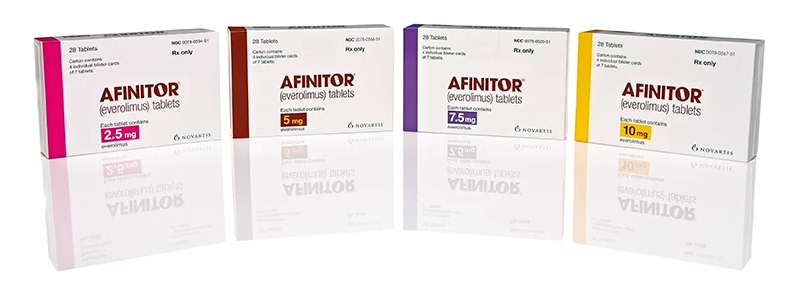Keytruda (pembrolizumab) vs Afinitor (everolimus)
Keytruda (pembrolizumab) vs Afinitor (everolimus)
Keytruda (pembrolizumab) and Afinitor (everolimus) are both used to treat certain types of cancer, but they work in different ways. Keytruda is an immunotherapy drug that helps the immune system to detect and fight cancer cells by blocking the PD-1 pathway, which can improve the immune response against cancer cells. In contrast, Afinitor is a targeted therapy that works by inhibiting the mTOR pathway, which is involved in cell growth and proliferation, and is used for cancers that have shown to be responsive to this pathway inhibition. When deciding which medication is appropriate, it is crucial to consider the specific type of cancer, its genetic markers, and how advanced the disease is, as well as the patient's overall health and treatment history. A healthcare provider will determine the best treatment option based on these factors and the approved indications for each medication.
Difference between Keytruda and Afinitor
| Metric | Keytruda (pembrolizumab) | Afinitor (everolimus) |
|---|---|---|
| Generic name | Pembrolizumab | Everolimus |
| Indications | Various types of cancer including melanoma, lung cancer, head and neck cancer, Hodgkin lymphoma, and others | Advanced hormone receptor-positive, HER2-negative breast cancer, advanced neuroendocrine tumors, renal cell carcinoma, tuberous sclerosis complex-associated seizures, and others |
| Mechanism of action | Programmed death receptor-1 (PD-1) blocking antibody | mTOR inhibitor |
| Brand names | Keytruda | Afinitor, Zortress |
| Administrative route | Injection (IV) | Oral |
| Side effects | Fatigue, cough, nausea, itching, skin rash, decreased appetite, constipation, joint pain, and diarrhea | Stomatitis, infections, rash, fatigue, diarrhea, edema, abdominal pain, nausea, fever, and headache |
| Contraindications | Individuals with hypersensitivity to pembrolizumab or any of its excipients | Individuals with hypersensitivity to everolimus, other rapamycin derivatives, or any of its excipients |
| Drug class | Anti-PD-1 monoclonal antibody | mTOR inhibitor |
| Manufacturer | Merck & Co. | Novartis Pharmaceuticals |
Efficacy
Keytruda (Pembrolizumab) Efficacy in Lung Cancer
Keytruda, also known as pembrolizumab, is a highly effective immunotherapy drug used in the treatment of various types of cancer, including lung cancer. It is particularly used in the treatment of non-small cell lung cancer (NSCLC), which is the most common type of lung cancer. Pembrolizumab works by targeting the PD-1 receptor on T cells, thereby enhancing the immune system's ability to detect and fight cancer cells. Clinical trials have demonstrated that Keytruda can significantly improve survival rates in patients with advanced NSCLC, especially those whose tumors express PD-L1, a protein that the drug specifically targets.
The efficacy of Keytruda in lung cancer treatment has been established through several studies, including the KEYNOTE series of trials. For instance, the KEYNOTE-024 trial showed that Keytruda significantly improved progression-free survival compared to chemotherapy in patients with high PD-L1 expression. Additionally, Keytruda has been approved by regulatory agencies for use as a first-line treatment in certain cases of advanced NSCLC, reflecting its efficacy in improving patient outcomes.
Afinitor (Everolimus) Efficacy in Lung Cancer
Afinitor, or everolimus, is a medication that is primarily used to treat various types of tumors, such as renal cell carcinoma and neuroendocrine tumors. It is an mTOR inhibitor, which works by interfering with cellular signaling pathways that are crucial for cell growth and proliferation. While Afinitor is not primarily indicated for lung cancer, it has been studied for its potential efficacy in treating certain types of lung cancers, such as non-small cell lung cancer (NSCLC).
The results regarding the efficacy of Afinitor in lung cancer have been mixed. Some studies have suggested that everolimus may have a role in treating NSCLC, particularly in cases where the cancer has progressed after initial treatment. However, its effectiveness as a treatment for lung cancer is not as well-established as other therapies like Keytruda. The use of Afinitor in lung cancer is considered off-label, and more research is needed to fully understand its potential benefits and to determine the specific patient populations that may derive the most benefit from this treatment.
Regulatory Agency Approvals
Keytruda
-
European Medical Agency (EMA), European Union

-
Food and Drug Administration (FDA), USA

-
Health Canada

-
Therapeutic Goods Administration (TGA), Australia

-
Medsafe (NZ)

Afinitor
-
European Medical Agency (EMA), European Union

-
Food and Drug Administration (FDA), USA

-
Health Canada

-
Pharmaceuticals and Medical Devices Agency (PMDA), Japan

-
Therapeutic Goods Administration (TGA), Australia

Access Keytruda or Afinitor today
If Keytruda or Afinitor are not approved or available in your country (e.g. due to supply issues), you can access them via Everyone.org.
How it works

Make an enquiry
Choose the medicine you want to buy, answer a couple of questions, and upload your prescription to speed things up. We’ll get back to you within 24 hours.


Make an enquiry
Choose the medicine you want to buy, answer a couple of questions, and upload your prescription to speed things up. We’ll get back to you within 24 hours.


Breeze through the paperwork
We'll guide you through the required documents for importing unapproved medicine, ensuring you have all the necessary information.


Get a personalized quote
We’ll prepare a quote for you, including medicine costs and any shipping, administrative, or import fees that may apply.


Receive your medicine
Accept the quote and we’ll handle the rest - sourcing and safely delivering your medicine.

Some text on this page has been automatically generated. Speak to your physician before you start a new treatment or medication.
Let's talk
If you have any questions, call us or send us a message through WhatsApp or email:
Contact us




